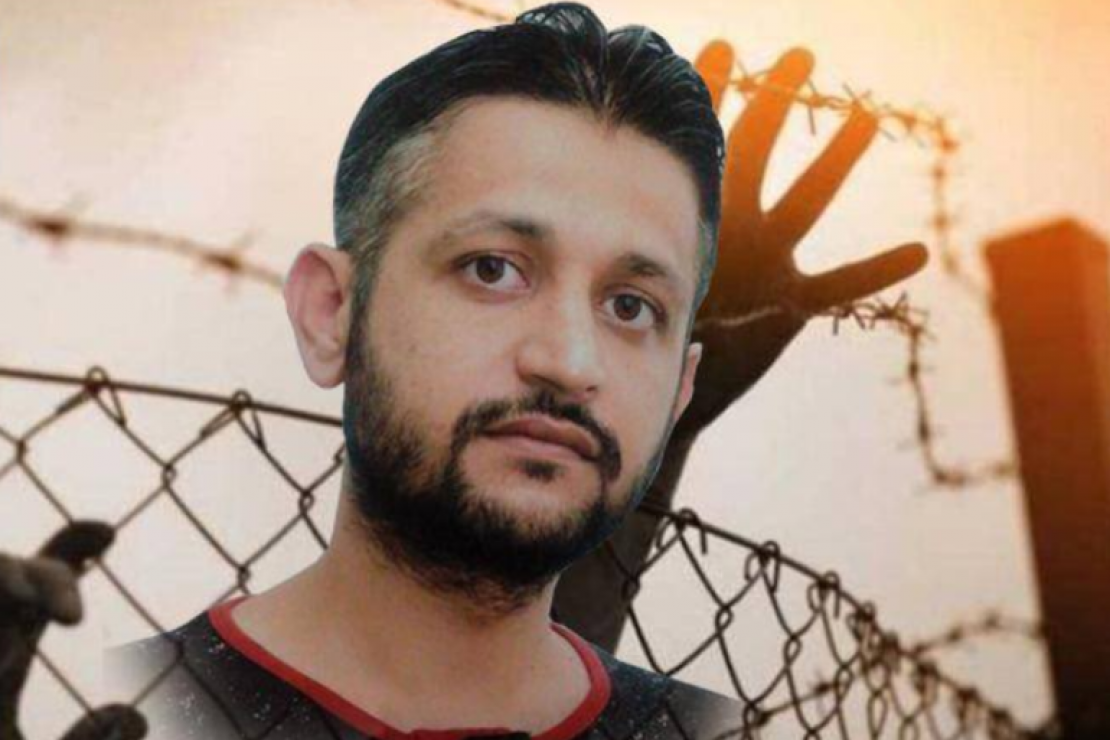Exclusive: Mohammed al-Arida's letter on Freedom Tunnel anniversary
Palestinian Prisoner and Operation Freedom Tunnel hero Mohammed Qasim al-Arida speaks out on the second anniversary of the operation that saw six prisoners liberating themselves from the Israeli occupation's maximum security Gilboa prison.
-

Palestinian prisoner Mohammed Qasim al-Arida.
Palestinian prisoner and Operation Freedom Tunnel Hero Mohammed al-Arida sent out a letter to Al Mayadeen on the occasion of the operation's second anniversary.
Palestinian Prisoner Mohammed al-Arida, one of the heroes of Operation Freedom Tunnel which saw six Palestinian prisoners reclaiming their freedom from the Israeli occupation's prisons, has been suffering under severe measures as he has been placed in solitary confinement at the occupation's "Ramon Prison."
Following is the letter written by the Palestinian Freedom Tunnel hero:
Over a period of nine months, the Earth was dug by the hands of 11 prisoners from Jenin until September 6, when she gave birth anew from her womb to six twin brothers, who were brought together by the journey of labor.
She placed them on her chest to instill in them her affection, and to let them drink from her fertile earth and blessing. She smiled at them, and embraced them - her sun shone for them, the moon smiled at them, and her stars winked at them with brilliance, and she poured out from the hearts of her children a flowing tenderness that they had never seen before. The oppressed rejoiced, and the anger of the oppressors overflowed. This was the birth of hope, the birth of repressed wishes.
Why did they not cry like infants at birth? Perhaps these children need some patience following their long wait inside the prisons, so she bestowed upon them the sweetness of her patience to equip them for days that would be even harsher. Six brothers came out on September 6 [the ninth month], which was the number of months they had to labor for their goal. Each of them was born into this life once from the womb of a nation, and once from the womb of the earth their mother, the mother of every Palestinian, but this time, they were all born anew as twins.
How beautiful is the dirt as it covers all our bodies? We had not seen it, we had not touched it, we had not held it, we had not seen it for decades. Our bodies were covered with the blessed earth of our homeland.
When our heads emerged from the exit hole, we saw the radiance of the loved ones who welcomed us longingly. What a beautiful feeling! We did not have one father or one mother, or one brother or sister, or sons or daughters. We saw our entire people and our nation embracing us lovingly. God has given us more satisfaction than we merit. Praise be to God, Lord of the Worlds, for all the blessings, mercy, and generosity.
I ask Him Almighty for his satisfaction and acceptance, as well as for steadfastness in religion and righteousness.
As we ran, we looked back with pain for those we left behind, with whom we lived all the years of separation from our loved ones. We dreamt with them the melody of freedom, our hope. We prayed, we wished, but we did not stay for long before we returned, but not among them, nor with them.
We wish to follow the will of God and have faith in justice, faith in truth, and faith in freedom. The believer draws his strength God. The greatest blessing is to believe in the judgment of God and His decree, not to wait for it and say, "I am a believer." The strong believer is better and more beloved by God than the weak believer.
Peace.
Your son, Mohammed al-Arida - Askalan solitary confinement
On September 6, 2021, al-Arida was one of six prisoners who broke out of Gilboa Prison in a heroic operation that shook the Israeli occupation's trust in its security system to the core.
The Israeli occupation court in Al-Nasirah issued a sentence of 5 years and 8 months of imprisonment and a fine against five of the Freedom Tunnel prisoners, in addition to four years of imprisonment against the other prisoners who provided them with assistance.
The Freedom Tunnel prisoners are Mahmoud al-Arida, Zakaria al-Zubaidi, Yaqoub Qadri, Mohammed Qasim al-Arida, Ayham Kamamji, and Munadel Nafi'at.

 2 Min Read
2 Min Read








